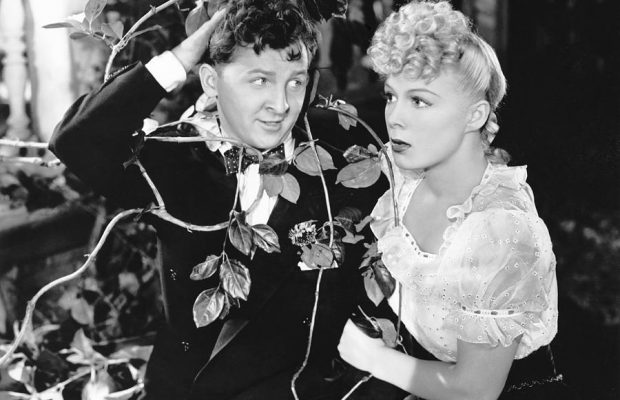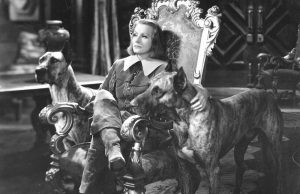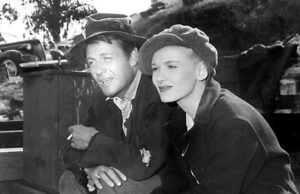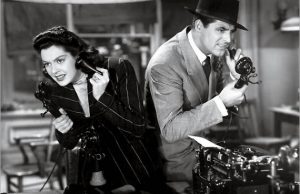The Miracle of Morgan’s Creek (1944)

Toronto Film Society presented The Miracle of Morgan’s Creek (1944) on Monday, March 17, 1980 in a double bill with All the King’s Men as part of the Season 32 Monday Evening Film Buff Series, Programme 7.
Production Company: Paramount. Director: Preston Sturges. Screenplay: Preston Sturges. Photography: John F. Seitz. Editor: Stuart Gilmore. Art Direction: Hans Dreier, Ernst Fegte. Musical Score: Leo Shuken, Charles Bradshaw. Set Decoration: Stephen Seymour. Make-up: Wally Westmore. Costumes; Edith Head. Sound Recording: Hugo Grensback, Walter Oberst.
Cast: Eddie Bracken (Norval Jones), Betty Hutton (Trudy Kockenlocker), Diana Lynn (Emmy Kockenlocker), William Demarest (Constable Kockenlocker), Porter Hall (Justice of the Peace), Emory Parnell (Mr. Tuerck), Julius Tannen (Mr. Rafferty), Al Bridge (Mr. Johnson), Vic Potel (Newspaper Editor), Brian Donlevy (Governor McGinty), Akim Tamiroff (the Boss), Almira Sessions (Wife of the Justice of the Peace), Esther Howard (Sally), J. Farrell MacDonald (Sheriff), Frank Moran (First M.P.), Connie Tompkins (Cecilia), Georgia Caine (Mrs. Johnson), Torben Meyer (Doctor), George Melford (U.S. Marshal), Jimmy Conlin (the Mayor), Harry Rosenthal (Mrs. Schwartz), Chester Conklin (Pete), Budd Fine (Second M.P.), Hal Craig (First State Policeman), Roger Creed (Second State Policeman), Max Wagner (Soldier), Keith Richards (Secret Service Man), Kenneth Gibson (Secret Service Man), Byron Foulger (McGinty’s Secretary), Arthur Hoyt (McGinty’s Secretary), Nora Cecil (Head Nurse).
Part of the delight in watching a Preston Sturges comedy like The Miracle of Morgan’s Creek dervies from sheer, admiring wonder. How, you ask yourself, did he get a name like Trudy Kockenlocker (which sounds no more innocent when it’s spoken) past the censors?
Next you ask yourself how he got the whole sneaky plot past the censors. Sturges probably went even further in his subsequent picture, Hail the Conquering Hero, another audacious and peculiarly ambivalent comic balancing act that somehow, in the middle of wartime, managed to flatter America’s sentimental self-images one moment and satirize the pants off them the next.
Reviewing Miracle in The Nation in February 1944, James Agee wrote:
Sturges tells this story according to a sound principle which has been neglected in Hollywood–except by him–for a long time in proportion to the inanity and repressiveness of the age you live in, play the age as comedy if you want to get away with murder. The girl’s name…of itself relegates her to a comic-strip world in which nothing need be regarded as real…and the wildly factitious story makes comic virtues of every censor-dodging necessity. Thanks to these devices the Hays office has been either hypnotized into a liberality for which it should be thanked, or it has been raped in its sleep.
Among other underhanded tricks, Sturges includes an implicit parody of the Christmas story, as it might be retold by a shamelessly imaginative press agent, making it the kind of only-in-America success story that is destined to sell a million papers, as well as a million items of whatever products the lucky couple elects to endorse. Trudy Kockenlocker is the name of the heroine, a dumb fun-loving small-town girl played by Betty Hutton. She has a smart kid sister played by Diana Lynn and both of them are a torment to their irritable widower father, the local constable, played with a wonderful, scowling, slow burn by William Demarest, perhaps the greatest “type” in the Sturges stock company. …
Sturges constructed the finest talking comedy machines in movie history. It’s a giddy pleasure to watch them operate and particularly to listen to the sounds they emit, the rapid, almost nonstop stream of dialogue, with virtually every character talking a surreal blue streak. In Miracle, the colloquies between Betty Hutton and Eddie Bracken leave you feeling slightly delirious, especially exchanges like the following, which occurs after Trudy has learned the embarrassing obstetric news:
Bracken: I thought you enjoyed yourself at the dance, Trudy.
Miss Hutton: I did, Norval, but some kinds of fun last longer than others, if you get what I mean.
The National Society of Film Critics on Movie Comedy by Gary Arnold, edited by Stuart Byron, Penguin 1977.












Leave a Reply